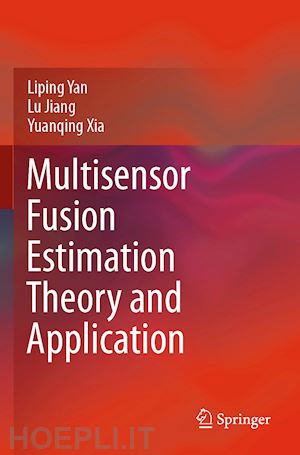
Questo prodotto usufruisce delle SPEDIZIONI GRATIS
selezionando l'opzione Corriere Veloce in fase di ordine.
Pagabile anche con Carta della cultura giovani e del merito, 18App Bonus Cultura e Carta del Docente
This book focuses on the basic theory and methods of multisensor data fusion state estimation and its application. It consists of four parts with 12 chapters. In Part I, the basic framework and methods of multisensor optimal estimation and the basic concepts of Kalman filtering are briefly and systematically introduced. In Part II, the data fusion state estimation algorithms under networked environment are introduced. Part III consists of three chapters, in which the fusion estimation algorithms under event-triggered mechanisms are introduced. Part IV consists of two chapters, in which fusion estimation for systems with non-Gaussian but heavy-tailed noises are introduced. The book is primarily intended for researchers and engineers in the field of data fusion and state estimation. It also benefits for both graduate and undergraduate students who are interested in target tracking, navigation, networked control, etc.
Lu Jiang was born in Shandong Province, China, in 1990. She received her B.S. degree in Automation from Qingdao University, Qingdao city, Shandong Province, P. R. China, in 2013, and received her Ph.D. degree in Control Science and Engineering from Beijing Institute of Technology, Beijing, China, in 2019. She is currently an Assistant Professor in Beijing Technology and Business University. Her research interests include multisensor data fusion, optimal state estimation, etc.
Yuanqing Xia was born in Anhui Province, China, in 1971, and graduated from the Department of Mathematics, Chuzhou University, Chuzhou, China, in 1991. He received his M.S. degree in Fundamental Mathematics from Anhui University, China, in 1998, and his Ph.D. degree in Control Theory and Control Engineering from Beijing University of Aeronautics and Astronautics, Beijing, China, in 2001. From 1991 to 1995, he was with Tongcheng Middle School, Anhui, China, where he worked as a teacher. During January 2002 to November 2003, he was a Postdoctoral Research Associate in the Institute of Systems Science, Academy of Mathematics and System Sciences, Chinese Academy of Sciences, Beijing, China, where he worked on navigation, guidance and control. From November 2003 to February 2004, he was with the National University of Singapore as a Research Fellow, where he worked on variable structure control. From February 2004 to February 2006, he was with the University of Glamorgan, Pontypridd, UK, as a Research Fellow, where he worked on networked control systems. From February 2007 to June 2008, he was a Guest Professor with Innsbruck Medical University, Innsbruck, Austria, where he worked on biomedical signal processing. Since July 2004, he has been with the Department of Automatic Control, Beijing Institute of Technology, Beijing, first as an Associate Professor, then, since 2008, as a Professor, and in 2012, he was appointed as Xu Teli Distinguished Professor in Beijing Institute of Technology and obtained National Science Foundation for Distinguished Young Scholars of China. His current research interests are in the fields of networked control systems, robust control, active disturbance rejection control and flight control. He has published eight monographs in Springer and John Wiley and more than 100 papers in journals. He is a Deputy Editor of the Journal of Beijing Institute of Technology, Associate Editor of Acta Automatica Sinica, Control Theory and Applications, International Journal of Innovative Computing, Information and Control. He obtained Second Award of Beijing Municipal Science and Technology (No.1) in 2010, Second National Award for Science and Technology (No.2) in 2011 and second natural science award of The Ministry of Education (No.1) in 2012.










Il sito utilizza cookie ed altri strumenti di tracciamento che raccolgono informazioni dal dispositivo dell’utente. Oltre ai cookie tecnici ed analitici aggregati, strettamente necessari per il funzionamento di questo sito web, previo consenso dell’utente possono essere installati cookie di profilazione e marketing e cookie dei social media. Cliccando su “Accetto tutti i cookie” saranno attivate tutte le categorie di cookie. Per accettare solo deterninate categorie di cookie, cliccare invece su “Impostazioni cookie”. Chiudendo il banner o continuando a navigare saranno installati solo cookie tecnici. Per maggiori dettagli, consultare la Cookie Policy.